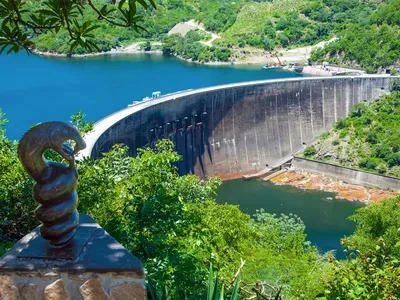
Zambia’s Hydropower Crisis Worsens As Lake Kariba Water Levels Hit Record Low

Water levels in Lake Kariba have hit a record low, threatening power supplies from the Kariba Dam, which provides electricity to Zambia and Zimbabwe.
The lake’s water levels have dropped to the lowest point in 65 years due to severe drought, which has caused extensive disruption to agriculture and energy production.
As a result, both countries have restricted water flow through the dam, leading to extensive power cuts and slowing economic growth.
Zambia’s state-owned power company, Zesco, has noted that even the recent rains have not been enough to restore water levels to a sustainable level for power generation.
Related News: Zambia’s Electricity Crisis Worsens As Over-Reliance On Hydropower Backfires
It will be recalled that West Africa Weekly previously reported that Zambia has been impacted by severe electricity shortages, with some areas experiencing blackouts lasting up to three days.
The shortages have exposed Zambia’s heavy (85 per cent) reliance on hydropower from the Zambezi River and the Kariba Dam, now producing only 7 per cent of its 1,080 MW capacity.
The severe electricity shortages have plunged the nation into darkness as the country refuses to tap into its cheap fossil fuel (like coal) reserves.
Despite having large coal reserves, Zambia generates only 13 per cent of its power from coal, mainly due to its focus on renewable energy due to ‘climate change’. Instead, Zambia exports most of its coal, ranking 60th among the world’s largest exporters of coal briquettes in 2022.
However, the recent crisis has led Zambia and Zimbabwe to pursue alternative energy sources, including coal and solar power projects, to secure a more reliable power supply.
Read More:
- Gina Prince-Bythewood Announces Open Casting Call In Nigeria For Tomi Adeyemi’s Children Of Blood And Bone
- Edo Gov. Okpebholo Nominates Oshiomhole’s Son as Commissioner to Compensate Oshiomhole, His godfather
- Customs Hits N5.07 Trillion Revenue Target Following Forex Crisis and Higher Tariffs
About The Author
Related Articles
Tinubu Government Delays Release of Signed Tax Acts to the Public
Four days after President Bola Tinubu announced the signing of four tax...
ByMayowa DurosinmiJune 30, 2025As Tinubu Urges Africa-Caribbean Unity in Saint Lucia, Over 272 Nigerians Killed in June Alone
While Nigerians deal with deadly violence, worsening hunger, and mass flooding, President...
ByWest Africa WeeklyJune 30, 2025You Can’t Tax a Dead Economy: Nigeria Is Suffocating Under Its Own Policies
As Nigeria’s Central Bank clings to its benchmark interest rate of 27.5...
ByWest Africa WeeklyJune 30, 2025“Wike is Not a Blessing to Us, He’s a Disaster” — Workers Protest in Nigeria’s Capital Over Unpaid Wages, Poor Working Conditions
Staff members of the Federal Capital Territory Administration (FCTA) in Abuja barricaded...
ByOluwasegun SanusiJune 30, 2025












Leave a comment